| Metric | Value |
|---|---|
| Barium Titanate Market Estimated Value in (2025 E) | USD 2.0 billion |
| Barium Titanate Market Forecast Value in (2035 F) | USD 3.4 billion |
| Forecast CAGR (2025 to 2035) | 5.2% |
The barium titanate market is undergoing a sustained growth phase, supported by rising adoption in passive electronic components, particularly within multilayer ceramic capacitors and semiconductors. This inorganic compound is gaining traction due to its high dielectric constant, ferroelectric properties, and lead-free composition, which make it ideal for integration into environmentally compliant electronic designs. The material’s compatibility with emerging chip miniaturization technologies and frequency tuning applications is expanding its usage across advanced telecommunication, computing, and automotive systems.
Increasing investments in renewable energy systems and electric mobility have further boosted demand for high-performance dielectric materials like barium titanate. Additionally, supply chain developments among specialty chemical producers and vertically integrated electronic component manufacturers are streamlining production and enhancing scalability.
Regulatory emphasis on RoHS and REACH compliance is also reinforcing the shift toward eco-efficient alternatives in ceramic and polymer composite formulations As innovation in energy-efficient electronics and green components intensifies, the market for barium titanate is expected to remain resilient across developed and developing economies alike.
The barium titanate market is segmented by form, application, end user, and geographic regions. By form, the barium titanate market is divided into Powder, Nanoparticles, Crystals, and Thin films. In terms of application, the barium titanate market is classified into Capacitors, PTC thermistors, Electronic ceramics, Reinforcement of composites, and Others (piezoelectric devices, memory devices).
The end users of the barium titanate market are segmented into Electronics and semiconductors, Automotive, Telecommunications, Medical devices, Aerospace and defense, Energy and power, and Research and academia. Regionally, the barium titanate industry is classified into North America, Latin America, Western Europe, Eastern Europe, Balkan & Baltic Countries, Russia & Belarus, Central Asia, East Asia, South Asia & Pacific, and the Middle East & Africa.
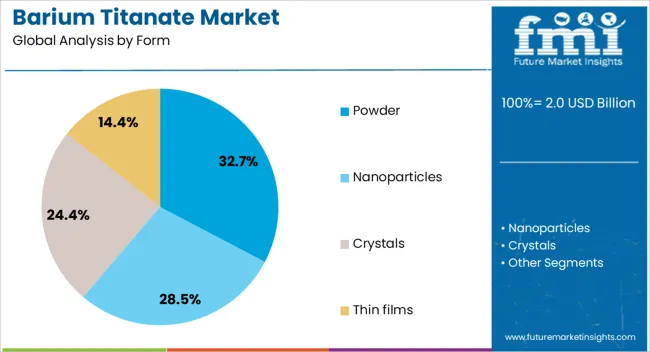
The powder form segment is anticipated to account for 32.7% of the total revenue share in the barium titanate market in 2025, making it the leading form type. This dominance is attributed to the superior versatility and ease of dispersion offered by barium titanate powders in various formulations used in electronic ceramics, polymer composites, and dielectric pastes.
High surface area and purity levels associated with powder forms enable precise control over sintering behavior and dielectric performance, which are critical parameters in capacitor and sensor manufacturing. The powder form has also been favored in additive manufacturing and printed electronics due to its adaptability with inkjet and screen printing techniques.
Ease of customization in particle size distribution and surface treatment has further enhanced its integration into high-k dielectric layers and multilayer ceramic devices As demand for miniaturized and high-capacitance components increases, the powder form continues to offer process flexibility and scalability, reinforcing its position as the preferred choice in commercial production environments.
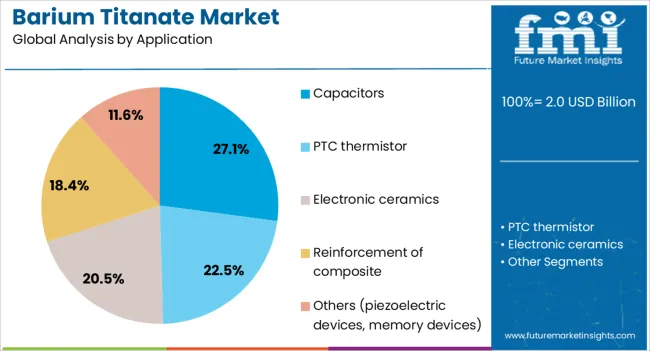
The capacitors segment is projected to represent 27.1% of the overall revenue share in the barium titanate market by 2025. This leadership is being driven by the material’s critical role in the production of multilayer ceramic capacitors used extensively in consumer electronics, automotive control systems, and telecommunication infrastructure.
Barium titanate’s high dielectric constant and stable temperature characteristics have made it indispensable in enhancing capacitance while maintaining compact device footprints. The growing penetration of advanced driver-assistance systems, 5G base stations, and data storage devices has intensified the need for reliable and efficient capacitors, further elevating demand for barium titanate-based ceramics.
Integration of barium titanate into embedded capacitor structures and flexible electronics has also expanded its applicability across evolving electronic design architectures. Continued innovation in surface-mount technologies and miniaturized circuitry is expected to reinforce the segment’s growth, positioning capacitors as a dominant application area for barium titanate in both mature and emerging markets.
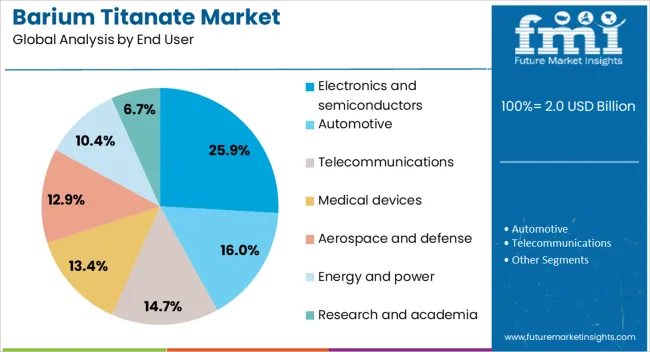
The electronics and semiconductors end user segment is expected to account for 25.9% of the total barium titanate market revenue in 2025, emerging as the most prominent industry vertical. This dominance is a result of rising demand for high-performance dielectric materials in integrated circuit packaging, chip capacitors, embedded systems, and logic boards.
Barium titanate’s ability to provide strong electric insulation, high frequency stability, and compatibility with lead-free manufacturing processes has positioned it as a material of choice among electronic component manufacturers. The shift toward miniaturization and functional density in semiconductors has accelerated the need for advanced dielectric layers, further boosting demand for barium titanate in thin film and nanocomposite formats.
As semiconductor fabrication processes evolve to support sub-10 nanometer technologies, the importance of materials that can deliver consistent performance at lower thicknesses and higher electric fields is growing. Barium titanate’s role in supporting this transition through material reliability and scalability has made the electronics and semiconductors segment a key contributor to market growth.
The barium titanate market is driven by increasing demand for high-performance capacitors and advanced electronic components. Opportunities are emerging in energy storage and renewable energy technologies, with the material being adopted for multi-functional applications in electronics. However, challenges related to raw material volatility and price fluctuations remain a significant restraint. As technological advancements continue, the market for barium titanate is expected to experience robust growth, particularly in power electronics and energy storage devices.
The barium titanate market is experiencing significant growth due to the rising demand for advanced capacitors and electronic components in industries like electronics, automotive, and telecommunications. Barium titanate, known for its excellent dielectric properties, is increasingly being used in the manufacturing of capacitors, sensors, and other critical electronic components. As industries continue to adopt more sophisticated technologies that require high-performance materials, the demand for barium titanate is expected to increase, driving the market’s growth over the next few years.
There are substantial opportunities in the barium titanate market, especially with the increasing demand for high-powered electronic devices and renewable energy technologies. The material’s ability to function in high voltage and high-temperature environments makes it ideal for applications such as energy storage devices and power electronics. The adoption of renewable energy technologies, such as solar and wind power, is also contributing to the growing demand for efficient energy storage solutions, further boosting the market for barium titanate.
A key emerging trend in the barium titanate market is its growing use in multi-functional applications, particularly in electronic devices. The material’s versatility is expanding its role beyond traditional uses in capacitors to more advanced applications such as piezoelectric sensors, actuators, and energy harvesters. These developments are largely driven by the increasing demand for smaller, more powerful, and efficient electronic devices. The trend of miniaturization in electronics, alongside advancements in wearable technology, will likely continue to shape the market dynamics for barium titanate.
Despite the growth potential, the barium titanate market faces several challenges, particularly related to the price volatility of raw materials. The production of barium titanate depends on the availability of certain minerals, and fluctuations in their prices can impact the overall production cost. Furthermore, the extraction and processing of these materials can be environmentally taxing, creating hurdles for manufacturers who seek cost-efficient and sustainable production methods. As demand increases, managing the availability and pricing of raw materials will be crucial for market stability.
| Countries | CAGR |
|---|---|
| China | 7.0% |
| India | 6.5% |
| Germany | 6.0% |
| France | 5.5% |
| UK | 4.9% |
| USA | 4.4% |
| Brazil | 3.9% |
The global barium titanate market is projected to grow at a 5.2% CAGR from 2025 to 2035. China leads with a growth rate of 7%, followed by India at 6.5%, and France at 5.5%. The United Kingdom records a growth rate of 4.9%, while the United States shows the slowest growth at 4.4%. These varying growth rates are driven by the increasing demand for barium titanate in industries such as electronics, energy storage, and manufacturing. Emerging markets like China and India are experiencing higher growth due to rapid industrialization, increasing electronic manufacturing, and government investments in sustainable technologies, while more mature markets like the USA and the UK see steady growth driven by advancements in material technologies and the increasing adoption of barium titanate in advanced applications such as capacitors and piezoelectric devices. This report includes insights on 40+ countries; the top markets are shown here for reference.
The barium titanate market in China is growing rapidly, with a projected CAGR of 7%. China’s strong demand for electronic components, coupled with the country's increasing investments in advanced materials and manufacturing, is driving the growth of barium titanate. The rising demand for barium titanate in applications such as capacitors, piezoelectric devices, and energy storage systems continues to accelerate market expansion. Additionally, China’s growing focus on sustainability, renewable energy, and electric vehicles, combined with government policies supporting green technologies, further contributes to the demand for barium titanate. The increasing adoption of advanced electronic devices in consumer and industrial sectors further fuels market growth.
The barium titanate market in India is projected to grow at a CAGR of 6.5%. India’s increasing demand for electronics, coupled with rapid industrialization, is driving the adoption of barium titanate in various applications, including capacitors and sensors. The country’s focus on modernizing manufacturing capabilities, increasing government investments in infrastructure, and rising consumer demand for electronic devices contribute to market growth. Additionally, India’s growing focus on renewable energy and sustainable technologies, including energy storage systems and electric vehicles, further accelerates the demand for barium titanate. As the country expands its presence in the global electronics market, the adoption of advanced materials like barium titanate is expected to rise.
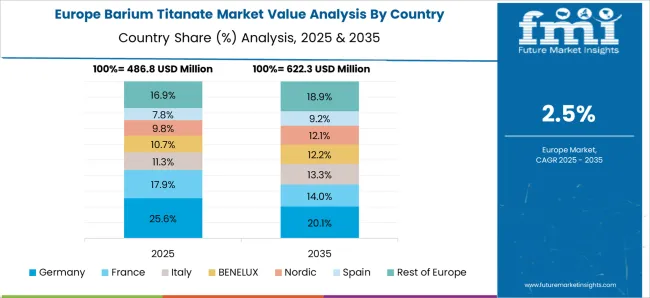
The barium titanate market in France is projected to grow at a CAGR of 5.5%. France’s demand for barium titanate is driven by the increasing adoption of electronic devices, sensors, and energy-efficient systems. The country’s growing focus on sustainable energy solutions, including solar power, energy storage, and electric vehicles, further accelerates market demand. Additionally, France’s commitment to reducing carbon emissions and improving energy efficiency through advanced materials contributes to the steady adoption of barium titanate in various industries. France’s strong manufacturing and automotive sectors, combined with rising investments in renewable energy infrastructure, support market growth.
The barium titanate market in the United Kingdom is projected to grow at a CAGR of 4.9%. The UK’s increasing focus on sustainable energy technologies, such as renewable energy systems and energy storage, is contributing to the steady adoption of barium titanate. Additionally, the country’s strong electronics and automotive industries continue to drive the demand for advanced materials, including barium titanate, in capacitors, sensors, and piezoelectric devices. The UK’s regulatory framework promoting energy efficiency, coupled with ongoing research and development activities in material sciences, accelerates market growth. The growing demand for electric vehicles and energy-efficient solutions further contributes to the adoption of barium titanate in various applications.
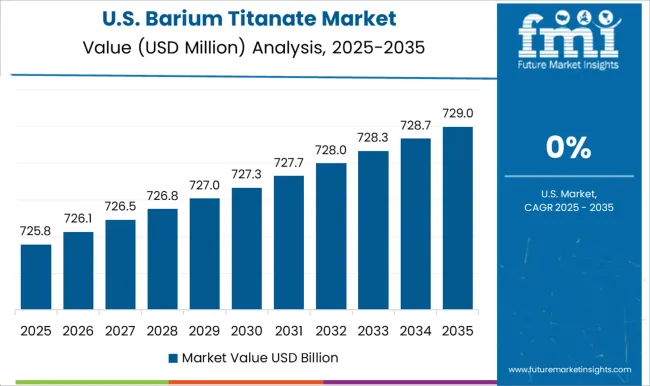
The barium titanate market in the United States is expected to grow at a CAGR of 4.4%. The USA market remains steady, driven by the increasing demand for barium titanate in electronic components, capacitors, and energy storage systems. The country’s focus on technological innovation and advancements in material science, along with increasing demand for sustainable and energy-efficient solutions, contributes to market growth. The rise in electric vehicle adoption, the expansion of renewable energy infrastructure, and government incentives for clean energy technologies further fuel the adoption of barium titanate. Additionally, the growth of the USA semiconductor industry continues to support the demand for advanced materials like barium titanate.
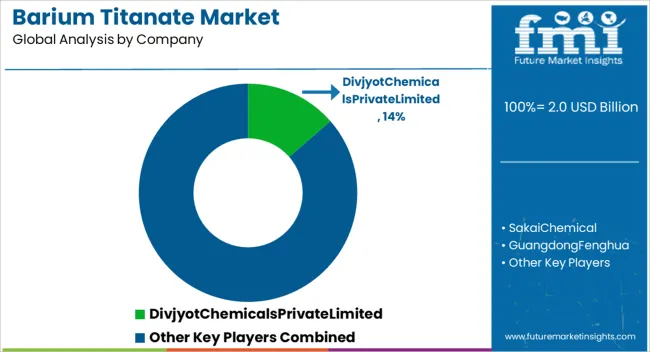
Key players such as Merck KGaA, Nippon Chemical, and Shandong Sinocera maintain significant market shares by offering high-performance barium titanate materials known for their superior dielectric properties and versatility in electronic components. These companies focus on enhancing material performance, improving production efficiency, and providing customized solutions for a range of industrial applications. Emerging players like Divjyot Chemicals Private Limited, Sakai Chemical, and Guangdong Fenghua are expanding their market presence by offering specialized barium titanate products for niche applications such as sensors, actuators, and advanced electronic devices. Their strategies include improving the purity of their barium titanate materials, enhancing the scalability of their production processes, and focusing on sustainable manufacturing practices. Market growth is driven by increasing demand for high-performance electronic components, the rise of electric vehicles, and the growing need for advanced materials in energy-efficient applications. Innovations in nanostructured barium titanate, enhanced material properties, and eco-friendly production methods are expected to continue shaping competitive dynamics and fuel further growth in the global barium titanate market.
| Item | Value |
|---|---|
| Quantitative Units | USD 2.0 Billion |
| Form | Powder, Nanoparticles, Crystals, and Thin films |
| Application | Capacitors, PTC thermistor, Electronic ceramics, Reinforcement of composite, and Others (piezoelectric devices, memory devices) |
| End User | Electronics and semiconductors, Automotive, Telecommunications, Medical devices, Aerospace and defense, Energy and power, and Research and academia |
| Regions Covered | North America, Europe, Asia-Pacific, Latin America, Middle East & Africa |
| Country Covered | United States, Canada, Germany, France, United Kingdom, China, Japan, India, Brazil, South Africa |
| Key Companies Profiled | DivjyotChemicalsPrivateLimited, SakaiChemical, GuangdongFenghua, SolvayS.A., NipponChemical, MerckKGaA, FujiTitanium, KMCCorporation, ShandongSinocera, PENTA.s.r.o., Ossila, and PKCHLOROCHEMPVT.LTD. |
| Additional Attributes | Dollar sales by application type and sector, demand dynamics across electronics, automotive, and energy industries, regional trends in barium titanate adoption, innovation in high-performance dielectric materials and energy storage systems, impact of regulatory standards on environmental safety, and emerging use cases in capacitors, sensors, and actuators. |
The global barium titanate market is estimated to be valued at USD 2.0 billion in 2025.
The market size for the barium titanate market is projected to reach USD 3.4 billion by 2035.
The barium titanate market is expected to grow at a 5.2% CAGR between 2025 and 2035.
The key product types in barium titanate market are powder, nanoparticles, crystals and thin films.
In terms of application, capacitors segment to command 27.1% share in the barium titanate market in 2025.






Full Research Suite comprises of:
Market outlook & trends analysis
Interviews & case studies
Strategic recommendations
Vendor profiles & capabilities analysis
5-year forecasts
8 regions and 60+ country-level data splits
Market segment data splits
12 months of continuous data updates
DELIVERED AS:
PDF EXCEL ONLINE
Barium Chloride Market Size and Share Forecast Outlook 2025 to 2035
Barium Fluoride Market Size and Share Forecast Outlook 2025 to 2035
Barium Nitrate Market Size and Share Forecast Outlook 2025 to 2035
Barium Carbonate Market Size and Share Forecast Outlook 2025 to 2035
Barium Sulfate Market Analysis - Size, Share & Forecast 2025 to 2035
Precipitated Barium Sulphate Market Growth – Trends & Forecast 2025 to 2035
Lead Zirconate Titanate Market Size & Trends 2025

Thank you!
You will receive an email from our Business Development Manager. Please be sure to check your SPAM/JUNK folder too.
Chat With
MaRIA